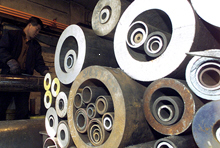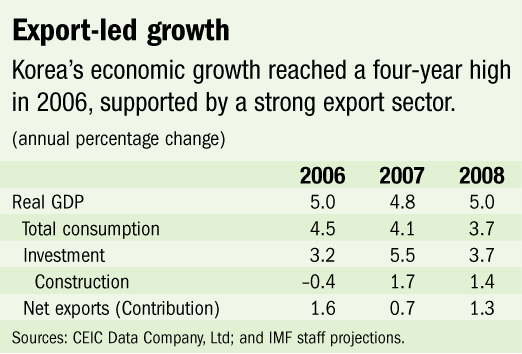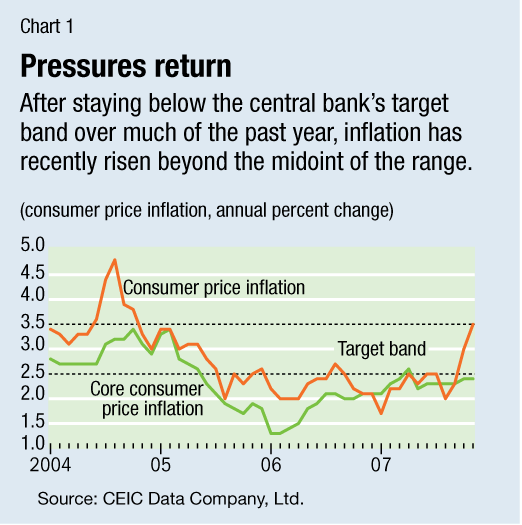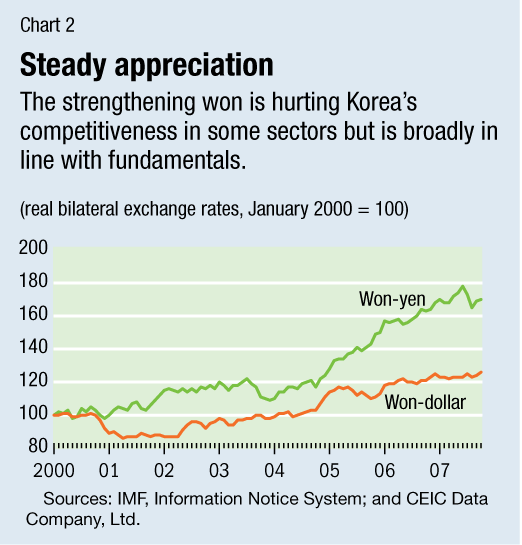
Typical street scene in Santa Ana, El Salvador. (Photo: iStock)
IMF Survey: Korea Adapts to Changing Landscape
December 19, 2007
- Korea has staged impressive economic recovery since Asian financial crisis
- Benign economic outlook remains vulnerable to global developments
- Long-term challenges require steps to bolster fiscal position, competitiveness
Korea's economic strength testifies to its success in adapting to the changing global economic landscape by pursuing forward-looking and prudent policies.

Steel factory in Seoul, Korea: IMF encourages government to ensure manufacturing continues to move up value chain (photo: Reuters)
ANNUAL ECONOMIC HEALTH CHECK
While near-term economic prospects are generally favorable, risks are mainly to the downside.
Since the 1998 Asian crisis, Korea's economy has expanded by nearly 6 percent a year, led by strong exports. Growth reached 5 percent in 2006 and is expected to slow marginally to 4 ¾ percent this year (see table).

After staying below the central bank's target band of 2½-3½ percent over much of the past year, inflation has recently risen beyond the midpoint of the range, reflecting recent gains in oil and food prices as well as technical factors (see Chart 1). Meanwhile, unemployment has fallen to a four-year low of 3.1 percent.
Oil import bill
The external current account is expected to remain in broad balance (neither in deficit nor surplus), with strong exports offset by a higher oil import bill and a further widening of the services deficit. The financial sector is in good health and the Korean currency, the won, appears to be "broadly appropriately valued," according to the IMF in its annual Article IV consultation with Korea.

Although the impact of the global financial turmoil on Korea's financial sector appears limited, a sharper-than-expected U.S. slowdown could have significant effects. In addition, the recovery in consumption is vulnerable to a downturn in asset markets and further oil price hikes. At the same time, long-term challenges are daunting: the rapid aging of the population risks threatening Korea's fiscal and external position, while the erosion of its low-skilled manufacturing base and low service-sector productivity could undermine external competitiveness and growth prospects.
Macro policies: steady as you go
After two consecutive rate hikes in July and August in response to the growth of monetary aggregates and asset prices, monetary policy tightening has paused, with growth and inflation risks appearing balanced. The monetary stance appears appropriate. If downside risks materialize, and provided inflationary pressures remain subdued, there may be scope for loosening monetary policy.
The current broadly neutral fiscal stance is about right, according to the IMF assessment. There is only limited scope for more expansive fiscal policy, in light of Korea's medium-term fiscal challenges.
Financial risks are manageable
Korea has done a lot in recent years to strengthen its financial sector. The payoff has been increased asset quality, profitability, and capital adequacy (i.e., banks' capital being adequate to protect depositors and counterparties from balance sheet risks). At the same time, risks assessment practices and credit information have improved.
Financial vulnerability is low and the sector looks well placed to deal with shocks. Still, pockets of domestic risks bear watching. A fall in housing prices could weaken consumption, especially since a sizable—albeit declining—share of households still hold short-term "bullet-type" mortgage loans (also called balloon loans, with principal paid in one large "balloon" payment at the end of the loan term).
Despite improvements in banks' risk-management practices, rapid growth in lending to small and medium-sized enterprises could lead to an increase in nonperforming loans, especially if the economy slows. Korean financial institutions' direct exposure to the U.S. subprime mortgage market is small.
External competitiveness
While some additional exposures may emerge over time, these are unlikely to have a major impact on financial sector balance sheets. However, prolonged global financial volatility could also dampen confidence and equity prices, trigger capital outflows, or lead to a tightening of credit conditions.
Korea's market-determined exchange rate has served it well. The won has appreciated against all major currencies (especially the yen) since 2003, but Korea's external competitiveness has stayed strong. The 60 percent real appreciation against the yen has, however, taken its toll on some sectors (such as electronics and autos). The currency now seems to be appropriately valued, with no signs of misalignment (see Chart 2).

Long-term challenges
Korea's medium-term prospects are good but its long-term challenges are considerable. Like many industrial countries, Korea will confront the burden of an aging society in coming decades.
Faced with the added fiscal pressure—compounded by a very low fertility rate and increasing life expectancy—Korea will need to adopt timely reforms on a number of fronts. These include raising tax revenues by broadening the tax base and improving tax administration, additional pension reforms, and reorienting public spending toward such high-priority areas as the social safety net. The IMF assessment commends Korea's efforts to address these challenges and to keep the public informed about long-term fiscal pressures.
Korea's manufacturing sector is likely to face increasingly intense competition from lower-wage countries, while the productivity of the services sector remains weak. To maintain competitiveness in global markets and sustain high growth rates over the long term, the IMF encourages the government to see that its manufacturing continues to move up the value chain and to continue opening and deregulating the services sector to enhance its productivity.
The IMF also recommends that Korea improve the flexibility of its labor markets and the investment climate—especially for foreign direct investment. Without such reforms, Korea's potential growth may decline steadily in coming decades.







